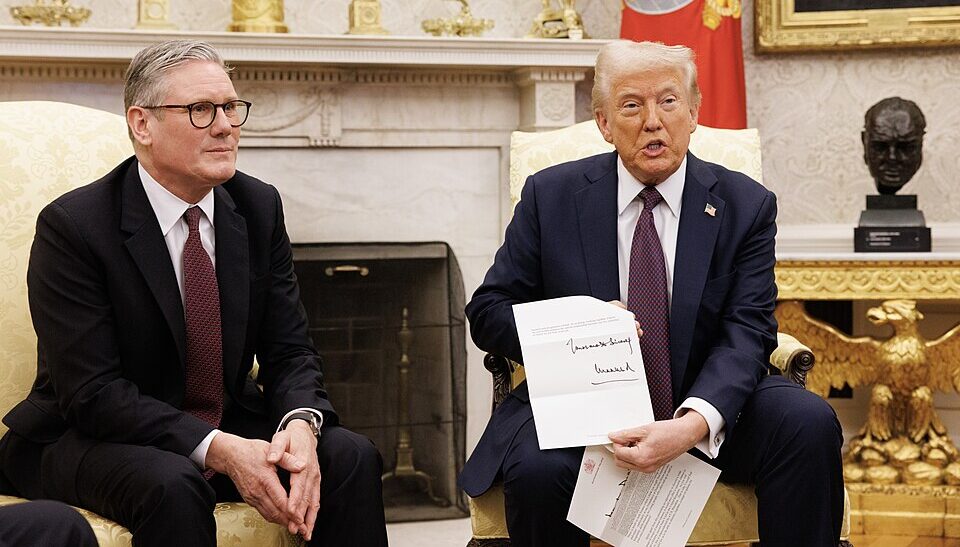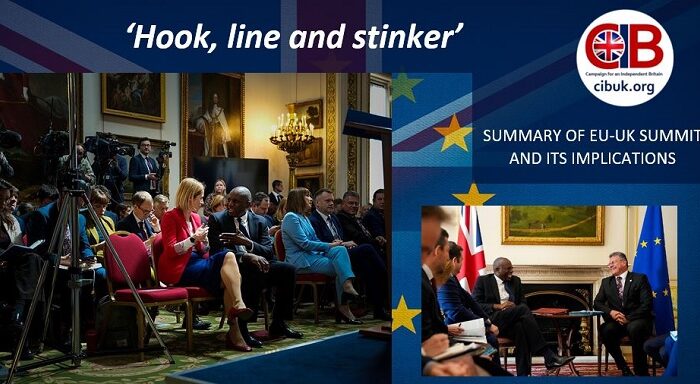‘Britain’s strategic dilemma’

We have a choice. The United Kingdom can either defend land or sea – it cannot do both. And if we have to choose it must be the sea. That is the blunt assessment of historian Robert Tombs in weighing up the stark choices now facing the UK as it grapples with the implications of a drastically revised foreign and defence policy following the election of Donald Trump in January.
However Professor Tombs believes the Prime Minister’s commitment to sending troops on the ground to Ukraine is not only futile, but historically and logistically illiterate.
“Let us be honest. We have never been able to intervene in central and eastern Europe: this was as true in 1849 (when we felt sorry for the Hungarians) and 1945 (when we felt sorry for the Poles) as it is today.”
Geography dictates that building up our navy is the surest way to defend our coastal waters with Russian boats already sailing around our shores and the Chinese soon to follow.
The policy implications are profound. Building up the navy would require a complete re-prioritisation of public expenditure commitments including a concentrated recruitment drive as well as investment in submarines, planes, drones and operational aircraft carriers and their escorts.
The alternative is to sit this one out in the hope that others come to our rescue. That would be reckless to put it mildly.
What follow is a summary with a link to the original article beneath it.
Where does our security lie?
Written by Robert Tombs
Britain’s oldest diplomatic strategy is in ruins. Donald Trump has begun to wake us up. We need to look to our security, but not just by talking about it. In present circumstances, sending inadequate forces to Ukraine would be insane. History rarely gives clear lessons, but this is surely one: to be safe, and to be influential, Britain must be a maritime power.
UK-US Diplomacy 1870-2025
Britain’s diplomatic strategy for more than 150 years – since 1940 perhaps its only coherent strategy – has been to ensure that the United States was never our enemy and if possible, our ally. This was dressed up with sentimentality, especially on our side. As early as the 1890s, Brits were exalting the solidarity of the ‘English-speaking peoples’, and in 1917 we managed to drag the Americans into the First World War. But the US has often been predatory and isolationist.
It has a long history of threatening Mexico and Canada. In the 1920s, it damaged Europe’s hard-won peace prospects by rejecting the Versailles Treaty and demanding full repayment of inter-allied loans. Its interwar tariff policy made the Great Depression worse. Between 1940 and 1945, it extracted much of Britain’s accumulated wealth and destroyed its trading system. Alliances are not friendships. Donald Trump is different only in his brazen cynicism. The great Lord Palmerston thought we should be friendly with the power than could do us most harm. That, for now at least, is the ‘Special Relationship’. Perhaps it always was.
UK-US Diplomacy post 2025
Trump has woken us up. Or more precisely, has made us stir in our long slumber. We now pay lip service to national defence. But the Prime Minister’s plan is to try to galvanise the Special Relationship by offering to put British troops into Ukraine to tempt Trump into providing the ‘backup’ he has repeatedly refused. We similarly put inadequate military forces into Iraq and Afghanistan, and before that into Bosnia, all to show that we were a useful ally of America or of the EU.
Let us be honest. The only thing we can usefully do is provide money, training and arms to Ukraine as long as they continue to resist, and encourage other countries to do the same. We have never been able to intervene in central and eastern Europe: this was as true in 1849 (when we felt sorry for the Hungarians) and 1945 (when we felt sorry for the Poles) as it is today.
UK’s unique geography
If we are serious, we must aim urgently to make ourselves as invulnerable as possible, so that we might be able to play an effective part in European or global affairs. A crucial aspect of Britain’s historic strength has been such invulnerability, despite its small population, its long coastline and its tiny army. Invulnerability was hard won, and only finally achieved after Trafalgar.
For centuries before, invasion was a constant danger. But Napoleon, the Kaiser and Hitler, all realized it was no longer feasible. So they tried to cut off our commerce, food and raw materials.
As early as the 1840s, enemies were gleefully anticipating the day when Britain would be starved. Fortunately, enemy surface raiders and submarines never came even close to succeeding. Instead, it was Britain that could starve its enemies: during the First World War perhaps 750,000 Germans died in consequence. During the Second World War, Britain could fight off a death-blow from the air thanks to 1930s developments in radar and fast fighters – the Luftwaffe never came close to winning the Battle of Britain. In contrast, the RAF eviscerated the German war effort, which was forced to devote vast resources to home defence against mass bombing, and decimated its work force.
And today? We are no longer invulnerable, and we are no longer able to retaliate against attack. Not only surface shipping, which carries 95 percent of our trade (even the Houthis can attack British ships), but undersea cables, pipelines and offshore wind farms are frighteningly vulnerable. We also discover that we have at best inadequate defence against air attack. As for cyber, I hate to think.
UK as maritime power
History rarely gives clear lessons, but this is surely one. To be safe, and to be influential, Britain must be a maritime power. We cannot (except very briefly in extreme emergency) be strong on both land and sea: hardly any state in history has managed this. We must not be distracted into building up land forces to send to the far side of Europe. Tanks cannot protect pipelines and windfarms. Nor will a regiment of Challengers in Ukraine frighten Putin. We cannot help allies when we are so vulnerable. At worst, brave soldiers sent to do the impossible lose life and limb to no purpose, and have to be rescued, as at Basra and Helmand. But naval power can support European security and deter aggressors.
A navy is expensive, but in a dangerous world it is indispensable to Britain’s prosperity and safety: the Russians are and the Chinese soon will be sailing round our coasts. Forty years of complacency mean that we have to start from the bottom up, first making a naval career attractive. Fortunately, navy personnel make up in effectiveness for small numbers.
In Queen Victoria’s heyday, the navy’s headcount was about the same as today’s, but they had the best (and most expensive) equipment. Now we need submarines, planes, drones and operational aircraft carriers and their escorts. We need a serious defensive and offensive cyber capacity – the modern equivalent of Palmerston’s gunboats. This would require fundamental political changes, including redirecting public spending and indefinitely postponing ‘net zero’, which is destroying our industrial capacity. You cannot defend yourself without energy, without industry, without steel. Whether the government does all this and fast will tell us whether it is just play-acting.
There are alternatives. One is to continue as we have done since the 1990s and let our defences run down through underfunding. To hope that danger will go away, and that the Americans will save us if it doesn’t. To disguise reality by talking up defence spending and making token gestures, like putting ‘boots on the ground’ and sacrificing a few hundred soldiers’ lives to save face. Another alternative would be to opt out, like Spain for example.
We are not in the front line. We could hope that others would sort out the world’s problems. That has not worked badly for Spain, and it would at least be honest. For the first time for 700 years, we would become spectators in world history, hoping that aggressors would always leave us in peace. Deep down, we know they won’t.
Postscriptum:
An earlier version of this article appeared in the Daily Telegraph, and it attracted many online comments. A good proportion of those largely agreed with me. But many expressed extravagant despair, some saying more or less that as we have mass immigration there is nothing worth defending so why bother. With respect, this is absurd.
Mass immigration, which I agree is hugely excessive, can be stopped by a sensible visa policy, and illegal immigration can be greatly reduced by political will. In any case, exposing ourselves to the danger of foreign attack is hardly a remedy for these undeniable problems. Other comments lamented the lack of patriotism and asserted that the young would not fight (for whatever reason).
It is true that we could probably not reproduce the mass volunteering of 1914-15, but that is not what we need. We need to expand the navy, and offer an attractive professional career to the many young people who are motivated not only by patriotism (though that certainly exists) but by having an interesting and fulfilling career and acquiring valuable skills.
I have had the pleasure of visiting one of His Majesty’s ships at sea, and seeing the young men and women who sailed her so skilfully. But pay and conditions (perhaps above all family housing) need to be greatly improved: they deter recruitment and lead to wastage. There is no point in have uncrewed ships.
This abridged article is re-published courtesy of Briefings for Britain. The original can be found here.
Main image attribution: Number 10, OGL 3, via Wikimedia Commons




